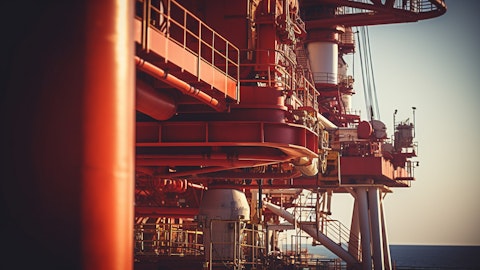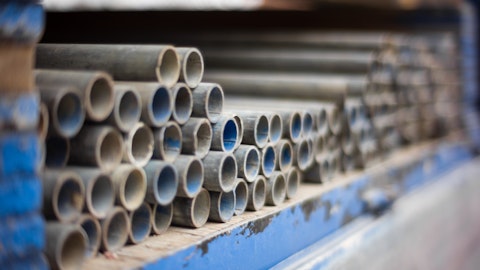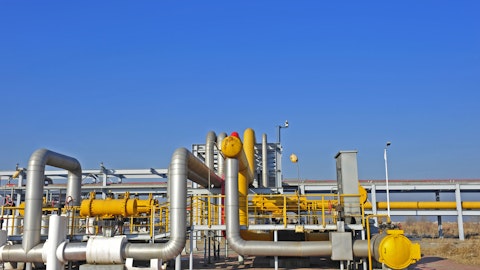David Anderson: Thank you, Gabriel. Just as a follow-up to that, I think you — in the remarks earlier you had said that you’re providing the pipe on Jafurah on the unconventional project there. I’m just curious, is Rig Direct a potential with Aramco? Or does Aramco procure their products differently where that model may not make sense with that particular NOC?
Gabriel Podskubka: Yes. Today, Rig Direct is not there, but the potential is there. Aramco has already changed their supply chains from foreign producers to the local network an ecosystem of producer on the different product lines. So the supply chain that we have today in the Kingdom is getting us closer to think of a Rig Direct potential. Today, the interaction, the demand planning and the procurement cycle of Aramco today is different than what it was two, three years ago where they were buying one, two years in advance to date, the synchronization between the manufacturing facilities in Saudi. And the rigs in Saudi is much more in due. So I think we are heading into a further integration down the line.
David Anderson: Okay. Thank you, Gabriel. Appreciate it.
Gabriel Podskubka: You are welcome, David.
Operator: Thank you. One moment for our next question. Our next question comes from the line of Jamie Franklin from Jefferies.
Jamie Franklin: Hi there. Thanks for taking my questions. Just three quick ones from me. So firstly, I just wanted to clarify on US volumes. If you can give us any color on the direction of change of the volumes and to what extent they moved in the first quarter? And then the second point which has been answered to some extent is just on the devaluation of the peso. So obviously, there’s several moving parts there in terms of the positive FX impact, but also a deferred tax liability. So I just wanted to understand, whether there are going to be any further impacts in the first quarter? And then final question just on expectations for working capital through 2024. Thanks.
Paolo Rocca: Thank you, Jamie. The last question is on CapEx for the entire year that’s correct? Or working capital?
Jamie Franklin: Working capital yes, through 2024.
Paolo Rocca: Yes. On the first one US volume, Luca maybe you can expand on where we see that we can increase our volume level.
Luca Zanotti: Sure. If we consider the three main let’s say, segment, which are the Gulf of Mexico, the onshore and the line pipe, I will see that we see on the Gulf of Mexico kind of stable volume heading into first quarter. Standard line pipe and line pipe in general it’s more or less equal. But I mean getting back to the point that we were making before on our large exposure to the largest operator and the most active regions. We see a significant increase in the OCTG volume. If I had to give a number it would be high single-digits.
Paolo Rocca: Yes. Because also I mean the contract that we are signing including the Exxon contract will drive some increase in volume for OCTG and really the position of Tenaris at the moment with a major player is very strong. And this player I think will be more resilient keeping their level of operation. Now one question that we will see and is important to analyze is also the effect of consolidation in this environment. This will lead to a change of the approach, the structure of the column longer lateral or some modification in the way the company will address the access to locations that are coming from a different consolidation. But I think we will see this…
Luca Zanotti: A little bit later on more into the back end of 2024.
Paolo Rocca: Yes. But in our view this could be a favorable effect for a company like Tenaris that has solid ties with this major operator. The second point is on devaluation and the possible impact in first quarter. Here Alicia you may give a view of this.
Alicia Mondolo: Okay, Thank you, Paolo. Hello, Jamie. The official exchange rate in Argentina was increased by almost 120% in the middle of December. After that the government set the growth impact at the range of 2% by month since that devaluation. The devaluation impact positive in our financial results since we were short to the exposure to Argentina peso and was a negative impact in our deferred tax asset because it produced an erosion of the fiscal value of the fixed assets. So if the growth impact will continue in order of 2% every month, we are not seeing another negative impact in our tax position. But if the new devaluation appears, we can expect some kind of effect in the deferred tax asset management. Not so we but we will see that. But at the moment we are not seeing that.
Paolo Rocca: Thank you, Alicia for devaluation. And the third point is on working capital. We do not expect a major change in working capital because Tenaris’s requires important working capital to operate its Rig Direct and RunReady mode way of operation. In this environment we have a substantial stability of volume not big changes in it. We will be able to maintain the working capital, releasing possibly some of it during 2024 because of a more efficient operation. We are continually striving to reduce the lead time in our plant and the lead time in our supply chain. And this progress will reflect in some release of working capital from inventories. On a part of receivable, if we are able to maintain the level of invoicing this will not change too much.
Jamie Franklin: Okay. Very clear. Thank you very much.
Operator: Thank you. One moment for next question. Our next question comes from the line of Joseph Charuy from Bank of America Securities.
Joseph Charuy: Good afternoon, gentlemen. Congrats on a strong set of results. I have two questions. Maybe we can talk about the moving parts on the cost side of the EBITDA equation. Do you have any further comments on potential impact of the Red Sea on logistics given that the situation is likely to persist for at least the next quarter? My second question is with regards to the dividend, obviously your $0.60 per share represents a nearly 20% uplift year-on-year. Is this a growth rate that you see being sustained moving forward? And then lastly maybe I’ll ask about the CapEx expectations for the full year 2024. Thank you.
Paolo Rocca: Thank you. Well, on the cost side, we don’t see major changes, because we will have some improvement in our cost following the devaluation in Argentina. But on the other side, other part of our cost system are moving in the opposite direction. Something that will be always relevant will be the evolution of the Hot Rolled Coils, because our system today is acquiring plates or Hot Rolled Coils on the market in fair volume. We have welded representing between 15% and 20% of our sales. In general apart from the Hot Rolled Coils, that could have a movement less predictable. We see some decline in price in raw material. The increase in Hot Rolled Coils may compensate this. So we do not expect major impact on our EBITDA today from movement in the cost. When we talk about the Red Sea here Gabriel you can tell us, because the region and these are regions,…
Gabriel Podskubka: Yeah.
Paolo Rocca: …mostly affecting the Eastern Hemisphere region.
Gabriel Podskubka: Yeah, Paolo. Just to comment on the Red Sea, it’s something that we have been monitoring very closely since the attacks started in November with practically no effect in December, but we are having a limited impact in this first quarter of 2024 around 50,000 tons of the one million tons plus that we manage every quarter are going through areas that are affected by the conflict in the Red Sea. Majority of these vessels have been diverted through South Africa with delays of about 15 to 20 days of longer delivery time. We are monitoring and in constant communication with our customers. So none of our customers are suffering any impact in their operations and this diversion of 15 to 20 days also affect some extra logistic costs in terms of fuel timing and limited insurance as well in the range I would say of $3 million in the quarter.
So I would say it’s quite limited. And since we also have in our industrial system multi-sourcing alternatives and we have experience with many logistic providers. I think we are able to manage this crisis with a relatively limited impact.
Paolo Rocca: Thank you, Gabriel. On the second question, well the dividend policy will be defined by the shareholder in the future. We don’t say much on the future dividend policy. What you can say is that this 20% increase together with the buyback is a significant return to shareholder money the 10% that I was mentioning, in my remarks. On the third point which is the CapEx we expect CapEx to be in the range of $700 million for 2024, considering the second — well, part of the second wind farm in Argentina that should be executed during 2024. We are in this range and this is what we see now.
Joseph Charuy: Thank you very much. Maybe just following up on that $3 million number is that the number that you incurred in the fourth quarter or the number that you expects to incur in the first quarter from the Red Sea logistical impact?
Gabriel Podskubka: In the first quarter and this is something that is a conflict maintain and persists probably to projects down the line, we will see. But it’s in the first quarter.
Joseph Charuy: Thank you very much.
Gabriel Podskubka: You bet.
Operator: Thank you. At this time I would now like to turn the conference back over to Giovanni Sardagna, for closing remarks.
Giovanni Sardagna: Thank you, Gigi and thank you all for joining us, at our conference call. See you soon.
Operator: This concludes today’s conference call. Thank you for participating. You may now disconnect.
Follow Tenaris S A (NYSE:TS)
Follow Tenaris S A (NYSE:TS)
Receive real-time insider trading and news alerts


